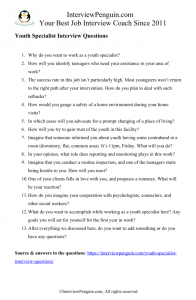Youth Specialist is basically a social worker, who works with teenagers aged between 10 and 18. You’ve been through this turbulent period of life, and surely understand all dangers and temptations youngsters face–physically, mentally, and emotionally.
Working either at school setting or directly for local/federal government, youth specialists try to uncover any problems their clients experience, and help them get back on track in their life and education. You will consult your clients, refer them to psychologists and healthcare professionals, maintain case management records, and basically try your best to improve their welfare.
Let’s have a look at questions you may face while interviewing for this interesting position, which pays 13$ per hour in average, in the United States.
Table of Contents
Why do you want to work as a youth specialist?
You certainly have your high ideals, and want to make some impact in the world, or at least in the life of individual youngsters you’ll work with. It’s fine mentioning it in your answer, but you should not stop there.
Try to find some reasons why you are an excellent candidate for the job, why it is a great match. Perhaps you graduated from social work, and understand the theory of case management. You’ve been always good in communication with young people, including the troublesome from their ranks. Having a good understanding for their emotional world and being mentally resilient, you believe to have what it takes to excel in this job.
Another option is telling them a personal story. Perhaps you also had your share of problems as a young man (or woman). It can be money, drugs, depressions, problems at school, whatever. Back then you didn’t see a way out of your problems until a social worker, a youth specialist, entered the scene. They showed you the light at the end of the tunnel and helped you to navigate your way towards that light.
This experience had a profound impact on your entire life, and it motivated you to pursue the same career. You simply want to pay back the favor, many times over.
* May also interest you: Social work interview -Tell me about yourself.
How will you identify teenagers who need your assistance in your area of work?
This is not always easy, especially when we talk about introverted teens who keep their problems to themselves (until they culminate in an extreme act, such as a suicidal attempt). But you can definitely suggest a few ways of identifying youth at risk.
First and foremost, you want to be visible in the community where you work (be it school, a certain neighborhood, or any other setting, depending on your place of work). You will do some campaign to ensure that the youth knows about the existence of your office, and how they can reach you. Making a short presentation in the classrooms is a nice idea–when you will work at a school setting.
Another thing you can mention is having a close cooperation with counselors, principals, teachers, social workers, and other professionals, who are in contact with the young people from the area (or with their families). They should definitely help you identify the cases where your intervention can help.
Last but not least, ensure them that you want to actively participate in the community, and keep your eyes open. Going to events and talking to the adolescent, you may also identify cases that need your attention.
The success rate in this job isn’t particularly high. Most youngsters won’t return to the right path after your intervention. How do you plan to deal with such setbacks?
It’s good to be idealistic (at least in my opinion), but in a job interview you should show realistic expectations. Ensure the interviewers that you are aware of the statistics, and do not dream of “saving” each single soul from the “hands of devil”.
Some people you will work with will remain drug addicts, some may commit suicide, or other bad things will happen. You know it will happen, and are mentally ready for it. Effort counts more than results in this profession. You will try your best in each case, but at the end of the day do not control all variables, you aren’t with your clients 24 hours a day.
Of course you have emotions, and maybe a tear or two will fall from your eyes, when nobody is looking. But you will get over your disappointment, knowing that you tried your best, and move on to work with the next client.
How would you gauge a safety of a home environment during your home visits?
I’d put emphasis on interviews. You will typically have to notify the parents/guardians about your visit in advance, and logically they can prepare, and play their game while you are in the house.
Confronting them with questions, however–and not necessarily pleasant questions, following your previous interviews with the teenager, you can easily observe their emotions, whether they get angry easily or show any signs of aggression.
You can also talk about some signs you will try to notice while visiting the place. Is the place tidy and clean? Are there any alcohol bottles left on the ground or in the bin? Any broken things or other items that suggest regular conflicts or fights? And what do the neighbors say?
Ensure the interviewers that you will look for details, but the core of your job will always consist in the interviews. If the teenager shakes and says that he or she doesn’t feel safe at home at all, what you see around you (for example a tidy house) is of secondary importance…
In which cases will you advocate for a prompt changing of a place of living?
I suggest you to say that you will consider each case individually. Say that what happens in a house is one thing, and how the youngster perceives it, and the impact it has on them, another one.
Of course if there is physical or mental abuse, or you sense that a disaster is about to happen, you won’t hesitate and suggest an immediate rehousing of the client.
You may also suggest that you prefer to consult the situation with the psychologist and perhaps also some other social workers (who have regular contact with the client). Showing that you are a team player and won’t make important decisions based solely on your personal judgment, is always a good thing to do in an interview.
* May also interest you: Social work interview – What are your strengths and weaknesses?
How will you try to gain trust of the youth in this facility?
Everything is ten times easier if the clients trust you. But gaining their trust is not easy. You can suggest actively participating in their recreational activities, being honestly interested in their feelings and problems, trying to fit in, with your language, clothes, attitude (of course this has some limits).
Another good idea is saying that you want to make sure they can trust you. If someone shares with you a confidential piece of information, you won’t share it further. Once they see that what is said and done in your office (or when you talk to them in some other place) stays in your office, they will find it easier to trust you.
Imagine that someone informed you about youth having some contraband in a room (dormitory, flat, common area). It’s 11pm, Friday. What will you do?
Rules are clear at this point. You should go and make an inspection in the area. Of course whether you go alone, with a colleague, or call police outright, depends a lot on your place of work, and the circumstances. But you won’t let it go, though it is Friday evening, and everyone deserves a bit of entertainment.
Contraband is forbidden, and you know that things can escalate quickly. Better to make an early intervention than waiting, and later seeing one of your clients ending up in jail…
Other questions you may face in your youth specialist interview
- In your opinion, what role does reporting and monitoring plays in this work?
- Imagine that you conduct a routine inspection, and one of the teenagers starts being hostile to you. How will you react?
- One of your clients falls in love with you, and proposes a romance. What will be your reaction?
- How do you imagine your cooperation with psychologists, counselors, and other social workers?
- What do you want to accomplish while working as a youth specialist here? Any goals you will set for yourself for the first year in work?
- After everything we discussed here, do you want to add something or do you have any questions?
* You can also download all questions in a one page long PDF, print it, and practice your interview answers anytime later:

Conclusion, next steps
Interview for a job of a youth specialist belongs to tricky interviews. Experienced social workers know how tough this job can be, both physically and mentally.
That’s why they will typically ask you plenty of situational questions, wondering how you will react in this or that situation that can realistically happen in the job.
Try to show mental resilience and ensure them that you can keep your distance at work. At the same time, however, you should show understanding for the mental and emotional world of the youth, and your willingness to gain their trust, and to cooperate with other social workers and professionals. I hope you will succeed and convince them, and wish you good luck!
Matthew
May also interest you:
- Case manager interview questions – Many of them may overlap with the youth specialist interview. Check them out and avoid any negative surprises in your interview.
- Guide on how to overcome interview nerves – Everyone is at least slightly nervous before the start of a job interview. But you should not let your nerves to control your mind, and to get the better of you when it matters the most. Learn how to do so.

